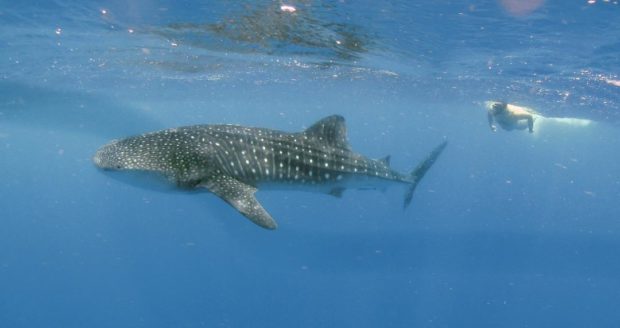Tourism program in Bohol town focused on whale sharks tagged ‘fake ecotourism’

Whale sharks roam freely in the seas of Bohol but they are now being fed now in Barangay Taug in Lila town which concerned experts and environmental advocates. (Photo courtesy: Jesse Acebes)
TAGBILARAN CITY—Criticism against a tourism program in a Bohol town focused on whale sharks continued to pour, with one environmental advocate calling it “fake ecotourism.”
Jesse Vera Acebes, of the nonprofit group Balyena at Lumba sa Pilipinas, said officials of the town of Lila were promoting a tourism program harmful to whale sharks.
“This is just taking the cash,” said Acebes. “Nothing goes back to the animal,” he added.
“They are only taking advantage of the animals and not looking out for their welfare,” he said.
In Lila, Acebes said “ecotourism is most of the time false.”
Article continues after this advertisementThe group which Acebes represents, Balyena.org-Balyena at Lumba sa Pilipinas, was formed in 2009 by a group of friends and colleagues who are doing research on whales and dolphins in the Philippines.
Article continues after this advertisementAceves called cases of humans feeding whale sharks in Lila a tragedy. “This is not Bohol’s pride. This is abuse. What a shame,” Acebes added.
“We periodically see these gentle giants pass by Jagna and other towns along the coast,” Acebes said referring to another town.
“Now you are baiting and peddling them to tourists. What a shame on your part,” he said. Acebes has had occasional close encounters with whale sharks.
The presence of whale sharks in the waters off Lila have enticed tourists to visit Bohol to interact with the biggest species of fish in the world.
The town charges entrance fees of P1,000 for foreigners and P500 for locals.
Philip Quiño, one of the operators of the Taug Whale Shark Watching and Snorkelling, said activity in the whale shark site were only watching and snorkeling.
But videos of visitors feeding the whale sharks had gone viral on social media.
Acebes said feeding would stunt the growth and reproduction cycles of whale sharks.
“It’s like us humans just being fed with one kind of food all the time. Whale sharks eat about 7 to 9 kinds of zooplankton, ” he said.
Acebes and other groups and coalitions have urged local and provincial governments and agencies to stop the feeding and physical interaction of tourists with whale sharks.
In a statement on Friday (Dec. 20), Bohol Gov. Arthur Yap said whale sharks need not be fed to stay alive as it will disrupt their habits and natural order.
“By feeding them, we are effectively keeping them captive,” the governor said.
“Worst, we are disabling their ability to survive in the wild,” he said.
“We are training them to be dependent on manual feeding and will expose them to untold dangers by conditioning them to approach boats and humans,” he added.
He asked the people of Lila and the local government ” to take a step back and reflect on these fundamental issues that define our very humanity.”
“The people and government of Lila must decide what they want to be: The savior of lives or the destroyer of worlds,” the governor added.
The local government of Lila had stayed mum on the criticisms.
Edited by TSB